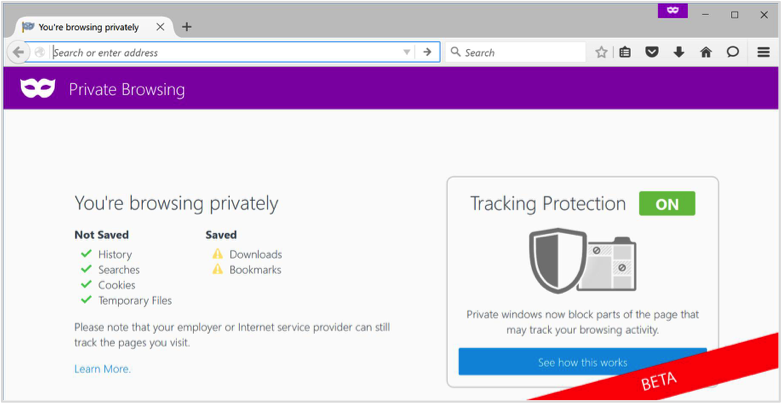Firefox 42 with a new "private" mode is available in beta test

Following the release of the latest stable version of Firefox 41 the day before yesterday, September 22, Mozilla published the next beta version of its browser, Firefox 42 . The product is available for testing on all major platforms: Windows, Mac, Linux and Android. The forty-second version of the browser carries a lot of innovations and a couple of killer features, including an experimental private mode for viewing web pages with protection from tracking the user.
Of the new features of the forty-second version, it is he who is of most interest to the general public, the new private mode for viewing web pages. Firefox will not just “not save” your browsing history, cookies and cache, as Chrome, for example, does, butBlock user activity tracking with internal protections.
Thus, working in Firefox 42 in private mode, the various methods of collecting your data and information about your activity that are practiced on the Internet under the guise of "collecting statistics" will stop working for you. The new built-in browser functionality can be compared to AdBlock, crossed with such additions that provide privacy on the network, such as Ghostery and Badger , which do not allow the collection of your personal data. This functionality has been available since August in Firefox Developer Edition for Windows, Mac and Linux platforms, and now it has “arrived” in the official beta version of the browser, including on Android.
Here's how Mozilla developers comment on the innovations:
Our hypothesis is that when you open a Private Browsing window in Firefox you're sending a signal that you want more control over your privacy than current private browsing experiences actually provide. The experimental Private Browsing enhancements ready for testing today actively block website elements that could be used to record user behavior across sites. This includes elements like content, analytics, social and other services that might be collecting data without your knowledge.
Transfer:
Our hypothesis is that when you open the Private Browsing mode in Firefox, you send a signal that you want more control over the privacy of your data than any other browser can provide you with today. The experimental incognito mode is already ready for testing and actively blocks elements of sites that can collect information about your actions. Such elements as information about the content of a web page, analytics of actions, social services and others, which can collect information about you without your knowledge, fall under the blocking.
The new private mode has a security and confidentiality control center located in the browser menu (burger button in three bars in the upper right corner). The “New Private Window” button starts the private viewing mode and activates protection, a message about which is displayed on the screen. After that, you just need to continue working on the web, as usual.

With these innovations, Mozilla is trying to take privacy in browsers to a new level. The company sees a large number of positive feedback from Firefox users regarding this area, especially from those who protected their personal data using various extensions and methods earlier.
In addition to the new “whistle” in the form of a private regime, there are other changes. For example, the forty-second version has better performance. With the protection mode on, the top 200 news resources show a decrease in page load time by an average of 44 percent, and the volume of downloaded traffic has decreased by an average of 39 percent.
Also in the beta version of Firefox is available a new functionality "muta" of the page. The introduction of this function in the future was reported back in July and now, finally, it is implemented in the beta of the forty-second version. The function shows the audio playback icon, as in Chrome, by clicking on which you can turn off the sound coming from the tab, which will be very useful when surfing pages with aggressive ads or just in the situation “where does this music come from !?” close the whole page.

In fairness, it is worth noting that in terms of "muta" pages Mozilla does not claim to be original. This functionality was previously available in the form of extensions or browser settings, for example, in Google Chrome, you can activate page mutations by clicking on the audio icon on the tab in chrome: // flags / (enter in the address bar), but “boxed” this functionality was not.
A complete list of changes that will be of interest to the developer can be found here .
When the release of the forty-second version of Firefox as the main one takes place, Mozilla has not yet announced.
Download links for Windows:
Firefox 42 beta RU
Firefox 42 beta RU x64
Firefox 42 beta en-US
Firefox 42 beta en-US x64
Firefox 42 developer RU
Firefox 42 developer EN x64
Firefox 42 developer en-US
Firefox 42 developer en-US x64
Download links for Linux :
Firefox 42 beta RU
Firefox 42 beta RU x64
Firefox 42 beta en-US
Firefox 42 beta en-US x64
Firefox 42 developer RU
Firefox 42 developer RU x64
Firefox 42 developer en-US
Firefox 42 developer en-US x64
